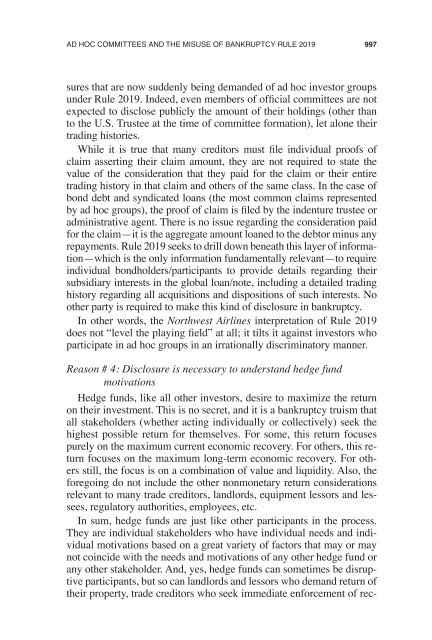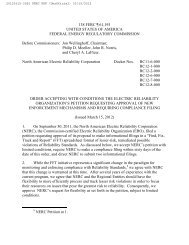Ad Hoc Committees and the Misuse of Bankruptcy Rule 2019
Ad Hoc Committees and the Misuse of Bankruptcy Rule 2019
Ad Hoc Committees and the Misuse of Bankruptcy Rule 2019
You also want an ePaper? Increase the reach of your titles
YUMPU automatically turns print PDFs into web optimized ePapers that Google loves.
<strong>Ad</strong> <strong>Hoc</strong> <strong>Committees</strong> <strong>and</strong> <strong>the</strong> <strong>Misuse</strong> <strong>of</strong> <strong>Bankruptcy</strong> <strong>Rule</strong> <strong>2019</strong> 997<br />
sures that are now suddenly being dem<strong>and</strong>ed <strong>of</strong> ad hoc investor groups<br />
under <strong>Rule</strong> <strong>2019</strong>. Indeed, even members <strong>of</strong> <strong>of</strong>ficial committees are not<br />
expected to disclose publicly <strong>the</strong> amount <strong>of</strong> <strong>the</strong>ir holdings (o<strong>the</strong>r than<br />
to <strong>the</strong> U.S. Trustee at <strong>the</strong> time <strong>of</strong> committee formation), let alone <strong>the</strong>ir<br />
trading histories.<br />
While it is true that many creditors must file individual pro<strong>of</strong>s <strong>of</strong><br />
claim asserting <strong>the</strong>ir claim amount, <strong>the</strong>y are not required to state <strong>the</strong><br />
value <strong>of</strong> <strong>the</strong> consideration that <strong>the</strong>y paid for <strong>the</strong> claim or <strong>the</strong>ir entire<br />
trading history in that claim <strong>and</strong> o<strong>the</strong>rs <strong>of</strong> <strong>the</strong> same class. In <strong>the</strong> case <strong>of</strong><br />
bond debt <strong>and</strong> syndicated loans (<strong>the</strong> most common claims represented<br />
by ad hoc groups), <strong>the</strong> pro<strong>of</strong> <strong>of</strong> claim is filed by <strong>the</strong> indenture trustee or<br />
administrative agent. There is no issue regarding <strong>the</strong> consideration paid<br />
for <strong>the</strong> claim—it is <strong>the</strong> aggregate amount loaned to <strong>the</strong> debtor minus any<br />
repayments. <strong>Rule</strong> <strong>2019</strong> seeks to drill down beneath this layer <strong>of</strong> information—which<br />
is <strong>the</strong> only information fundamentally relevant—to require<br />
individual bondholders/participants to provide details regarding <strong>the</strong>ir<br />
subsidiary interests in <strong>the</strong> global loan/note, including a detailed trading<br />
history regarding all acquisitions <strong>and</strong> dispositions <strong>of</strong> such interests. No<br />
o<strong>the</strong>r party is required to make this kind <strong>of</strong> disclosure in bankruptcy.<br />
In o<strong>the</strong>r words, <strong>the</strong> Northwest Airlines interpretation <strong>of</strong> <strong>Rule</strong> <strong>2019</strong><br />
does not “level <strong>the</strong> playing field” at all; it tilts it against investors who<br />
participate in ad hoc groups in an irrationally discriminatory manner.<br />
Reason # 4: Disclosure is necessary to underst<strong>and</strong> hedge fund<br />
motivations<br />
Hedge funds, like all o<strong>the</strong>r investors, desire to maximize <strong>the</strong> return<br />
on <strong>the</strong>ir investment. This is no secret, <strong>and</strong> it is a bankruptcy truism that<br />
all stakeholders (whe<strong>the</strong>r acting individually or collectively) seek <strong>the</strong><br />
highest possible return for <strong>the</strong>mselves. For some, this return focuses<br />
purely on <strong>the</strong> maximum current economic recovery. For o<strong>the</strong>rs, this return<br />
focuses on <strong>the</strong> maximum long-term economic recovery. For o<strong>the</strong>rs<br />
still, <strong>the</strong> focus is on a combination <strong>of</strong> value <strong>and</strong> liquidity. Also, <strong>the</strong><br />
foregoing do not include <strong>the</strong> o<strong>the</strong>r nonmonetary return considerations<br />
relevant to many trade creditors, l<strong>and</strong>lords, equipment lessors <strong>and</strong> lessees,<br />
regulatory authorities, employees, etc.<br />
In sum, hedge funds are just like o<strong>the</strong>r participants in <strong>the</strong> process.<br />
They are individual stakeholders who have individual needs <strong>and</strong> individual<br />
motivations based on a great variety <strong>of</strong> factors that may or may<br />
not coincide with <strong>the</strong> needs <strong>and</strong> motivations <strong>of</strong> any o<strong>the</strong>r hedge fund or<br />
any o<strong>the</strong>r stakeholder. And, yes, hedge funds can sometimes be disruptive<br />
participants, but so can l<strong>and</strong>lords <strong>and</strong> lessors who dem<strong>and</strong> return <strong>of</strong><br />
<strong>the</strong>ir property, trade creditors who seek immediate enforcement <strong>of</strong> rec-



